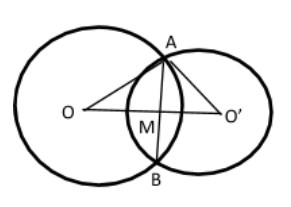Question
Question: Two circles of radii \(5cm\) and \(3cm\) intersect at two points and the distance between their cent...
Two circles of radii 5cm and 3cm intersect at two points and the distance between their centers is 4cm. Find the length of the common chord.
Solution
A circle is the path of a point which moves in a plane so that it remains at a constant distance from a fixed point in the plane. The fixed point is called the center and the constant distance from a fixed point in the plane. A line segment joining any two points of a circle is called a chord of the circle. The perpendicular from the center of a circle to a chord bisects the chord. Pythagoras theorem, “in a right-angled triangle, the square of the hypotenuse side is equal to the sum of the squares of the other two sides”.
Complete step-by-step answer:
Let us draw two circles of radii 5cm and 3cm intersect at two points A and B on the circumference of the circle.

Let O and O’ be the centers of the circles of radii 5cm and 3cm respectively.
Let AB be the common chord of the two circles.
As the line of centers is the perpendicular bisector of the common chord,
OO’⊥AB and M is midpoint of AB.
Let AM =x cm and OM =y cm.
As OO’ =4 cm (given), so MO’=(4−x)cm.
In ΔOMA,∠M=90∘, by Pythagoras theorem,
OA2=OM2+AM2
Substituting the values of OA, OM and AM in the above equation, we get
⇒52=y2+x2 ………....(i)
Now, InΔO′MA,∠M=90∘, by Pythagoras theorem,
O′A2=OM′2+AM2
Substituting the values of O’A, OM’ and AM in the above equation, we get
⇒32=(4−y)2+x2 ………….(ii)
Subtracting equation (ii) from (i), we get
25−9=y2−(4−y)2
By applying identity (a−b)2=a2+b2−2ab, we get
16=y2−(42+y2−2×4×y)
Simplifying the bracket first, we get
⇒16=y2−(16+y2−8y)
As we know, (−)×(+)=(−)and(−)×(−)=(+), therefore
16=y2−16−y2+8y
Cancelling y2from the R.H.S as one is having a positive sign and another is having a negative sign, we get
16=8y−16
Transposing 16 from R.H.S to L.H.S, we get
⇒16+16=8y
⇒32=8y
Now as 8 is multiplied by y in the R.H.S, so it will shift into the denominator of the L.H.S.
⇒832=y
As we know 8×4=32, therefore
4=y
Now putting 4=y in (ii), we get
32=(4−4)2+x2
⇒32=02+x2
⇒32=x2
Taking square root of boot sides, we get
3=x
∴Length of common chord AB=2×AM
⇒AB=2×x
As x=3cm, therefore AB=(2×3)cm
⇒AB=6cm
∴Length of common chordAB=6cm.
Note: In the above question, we observe that x=4⇒MO’=0
⇒The points M and O’ coincide.
⇒The center of the smaller circle lies on the common chord.
⇒The common chord is a diameter of the smaller circle.
